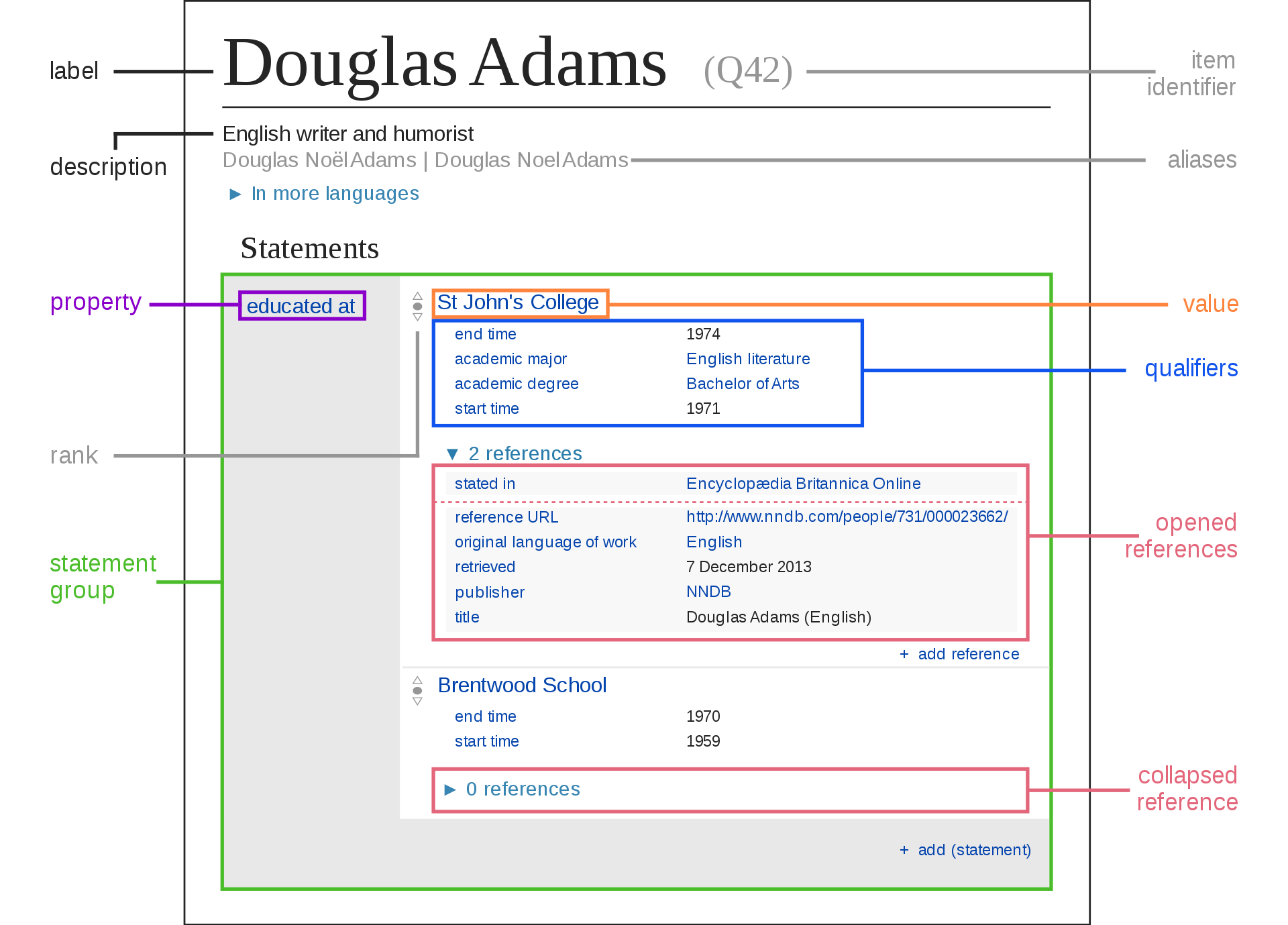Wikidata
“Wikidata… aims to create a free knowledge base about the world that can be read and edited by humans and machines alike.”
In 2012, the Wikimedia foundation launched Wikidata with the lofty goal of turning all of the world’s knowledge into Linked Data. Wikipedia is focused on the “document” or “Wiki page” as a piece of information. Wikidata on the other hand is focused on a single piece of data for every entry.
Lead by Wikimedia Deutschland and funded as a project by:
- Allen Institute for Artificial Intelligence,
- Gordon and Betty Moore Foundation,
- Google, Inc.
The original Wikidata project had three phases:
- Centralising interlanguage links – links between Wikipedia articles about the same topic in different languages
- Providing a central place for informational card data for all Wikipedias
- Creating and updating list articles based on data in Wikidata
Phase 1 went live in 2013 and Wikidata is currently in phase 2, as of 2016.
Learn more about the history of Wikidata, view current statistics outlining Wikidata’s growth, and explore this quick overview of how Wikidata works.
Wikidata Structure
Wikidata is a Linked Open Data project. Structured data which preserves the relationships between things. It leverages the principle of “Transclusion” which refers to the inclusion of a piece of information from one document into another. By using transclusion the “source” of a piece of information can be the same for many documents which makes it easier to maintain over time.
A large part of Wikidata’s goal is to structure data that naturally lends itself to being structured such as dates or locations. Wikidata acts as a backbone to some information presented in other projects such as Wikipedia (eg. the informational card about a place).
Wikidata also has an open query tool which allows any user to explore what is in Wikidata through the query language SPARQL.
Learn more about SPARQL.
Through the transclusion of individual pieces of information into many places Wikidata is able to equalising knowledge access because no one language gets prioritized. All languages associated with a datapoint are included in the entry for a concept.
On a community level Wikidata also supports community contributors by enabling micro-contributions which can be less work than Wikipedia contributions.
Same issue as other Wikimedia projects:
- Vandalism
- Slow growth
- Massive, ambitious, dataset
- Long-term maintenance
- Funding that kicked off the project was temporary
- Wikimedia foundation not formally supports but reliant on donations
- Higher learning curve for involvement than Wikipedia
- Community demographics, deep western bias
- Challenging ambition to “structure the sum of all human knowledge”
Data Model

“The Wikidata repository consists mainly of items, each one having a label, a description and any number of aliases. Items are uniquely identified by a Q followed by a number, such as Douglas Adams (Q42).
Statements describe detailed characteristics of an Item and consist of a property and a value. Properties in Wikidata have a P followed by a number, such as with educated at (P69). “
Learn more about Wikidata’s structure.
Tools to explore for WikiData
- Reasonator makes Wikidata Entries look easier to read
- Wikidata Query Tool allows (try selecting an Example query from the menu)
- Scholia accessed at https://scholia.toolforge.org/
Wikidata for Teaching
Wikidata has a number of educational resources to help educators teach linked open data concepts.
Learn more and explore educational resources.
Wikidata for Research
Wikibase is a powerful tool for exploring linked open data concepts and leveraging linked open data structures in the context of a research project.
Explore Wikibase
Example projects that use Wikibase
- Linked Jazz (a project that shows the history of Jazz through linked open data)
- Gene Wiki (a project that is working to include every notable human gene in Wikipedia)
- FactGrid “FactGrid”, which is a database for historians is run off of Wikibase.
- Enslaved Michigan State University’s “Enslaved” project brings together data on individuals who were enslaved by or involved in the slave trade.